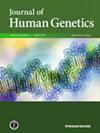Pathogenic variants in SHROOM3 associated with hemifacial microsomia
IF 2.5
3区 生物学
Q2 GENETICS & HEREDITY
引用次数: 0
Abstract
Hemifacial microsomia (HFM) is a rare congenital disorder that affects facial symmetry, ear development, and other congenital anomalies. However, known causal genes account for only approximately 6% of patients, indicating the need to discover more pathogenic genes. Association tests demonstrated an association between common variants in SHROOM3 and HFM (P = 1.02E-4 for the lead SNP), while gene burden analysis revealed a significant enrichment of rare variants in HFM patients compared to healthy controls (P = 2.78E-5). We then evaluated the expression patterns of SHROOM3 and the consequences of its deleterious variants. Our study identified 7 deleterious variants in SHROOM3 among the 320 Chinese HFM patients and 2 deleterious variants in two HFM trios, respectively, suggesting a model of dominant inheritance with incomplete penetrance. These variants were predicted to significantly impact SHROOM3 function. Furthermore, the gene expression pattern of SHROOM3 in the pharyngeal arches and the presence of facial abnormalities in gene-edited mice suggest that SHROOM3 plays important roles in facial development. Our findings suggest that SHROOM3 is a likely pathogenic gene for HFM.

SHROOM3致病性变异与面肌短小症相关。
半面小畸形(HFM)是一种罕见的先天性疾病,影响面部对称,耳朵发育和其他先天性异常。然而,已知的致病基因仅占约6%的患者,这表明需要发现更多的致病基因。关联测试显示SHROOM3的常见变异与HFM之间存在关联(先导SNP的P = 1.02E-4),而基因负担分析显示,与健康对照组相比,HFM患者中罕见变异显著富集(P = 2.78E-5)。然后,我们评估了SHROOM3的表达模式及其有害变异的后果。我们的研究在320例中国HFM患者中发现了7个SHROOM3有害变异,在两个HFM三人组中分别发现了2个有害变异,提示存在不完全外显的显性遗传模式。预计这些变异会显著影响SHROOM3的功能。此外,SHROOM3在咽弓中的基因表达模式和基因编辑小鼠面部异常的存在表明SHROOM3在面部发育中起重要作用。我们的研究结果表明SHROOM3可能是HFM的致病基因。
本文章由计算机程序翻译,如有差异,请以英文原文为准。
求助全文
约1分钟内获得全文
求助全文
来源期刊

Journal of Human Genetics
生物-遗传学
CiteScore
7.20
自引率
0.00%
发文量
101
审稿时长
4-8 weeks
期刊介绍:
The Journal of Human Genetics is an international journal publishing articles on human genetics, including medical genetics and human genome analysis. It covers all aspects of human genetics, including molecular genetics, clinical genetics, behavioral genetics, immunogenetics, pharmacogenomics, population genetics, functional genomics, epigenetics, genetic counseling and gene therapy.
Articles on the following areas are especially welcome: genetic factors of monogenic and complex disorders, genome-wide association studies, genetic epidemiology, cancer genetics, personal genomics, genotype-phenotype relationships and genome diversity.
 求助内容:
求助内容: 应助结果提醒方式:
应助结果提醒方式:


